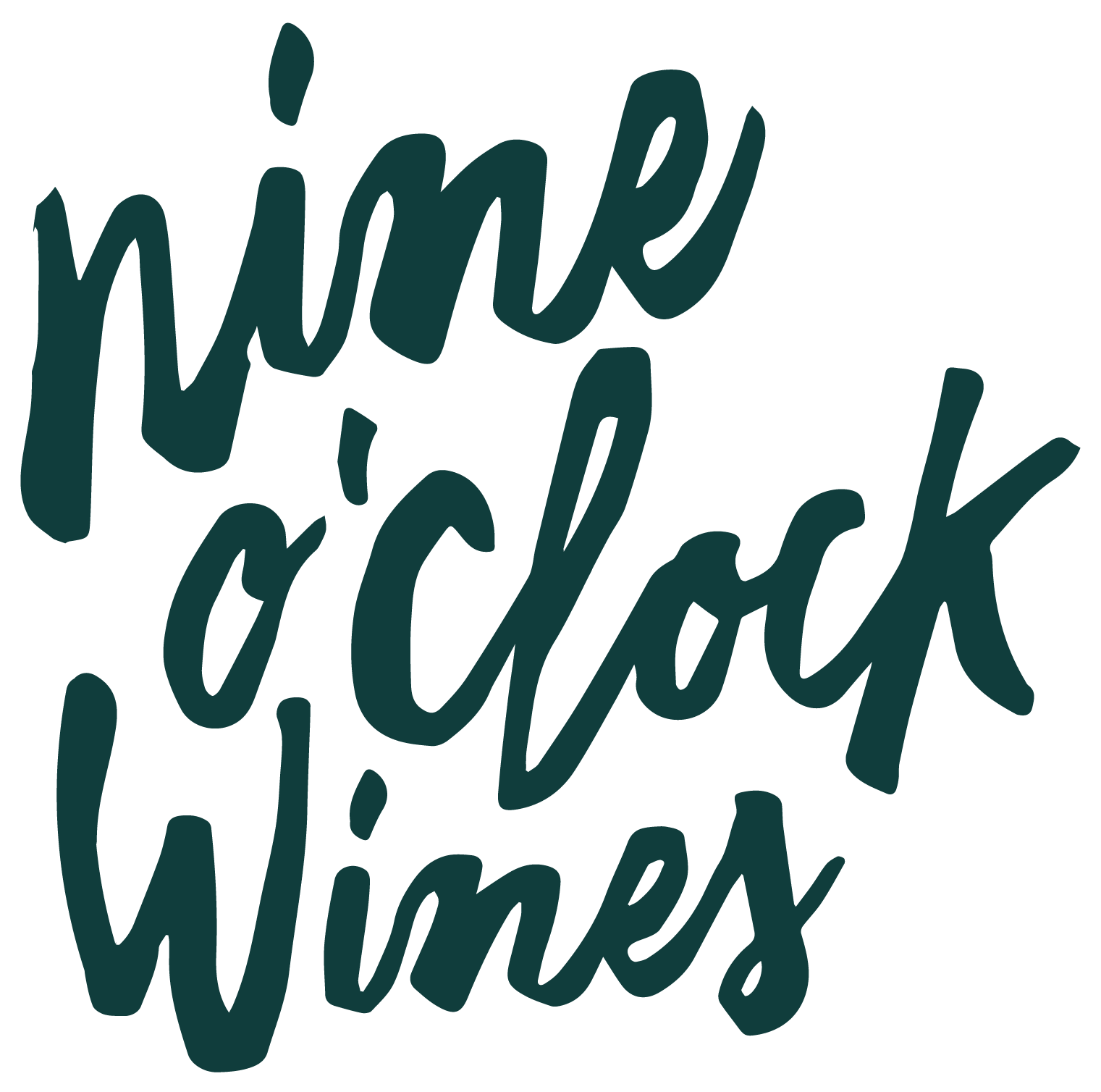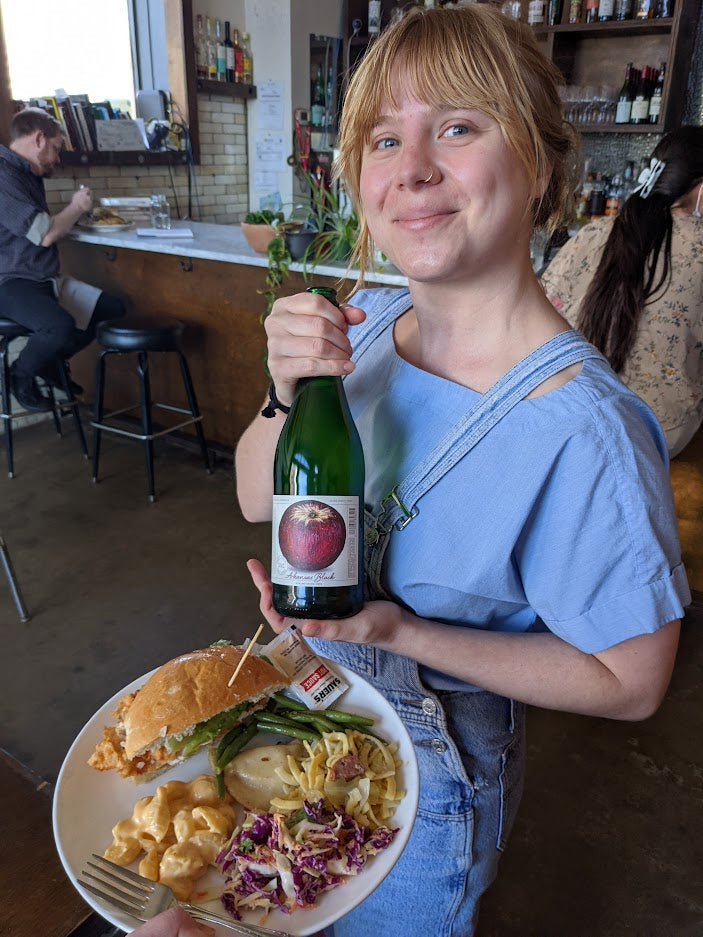This is from one of our past wine club letters, when we included Ploughman Farm Cider's pet-nat-style cider in our May 2022 selection:
One of Christie and my personal adages is that sparkling wine is for every occasion. It's fun, it's versatile, it's made in a bunch of different styles and it can brighten an otherwise mundane day. In our personal mission to get people to drink more sparkling wine, we’re making this wine club an all-sparkling extravaganza! If that weren’t exciting enough for us, we’re absolutely thrilled to bring you a naturally-made sparkling cider from Pennsylvania! Since we opened, we’ve been trying to find a natural PA wine that we loved. We’re still on the hunt, but this cider feels like good progress! We’ve included a large portion of our correspondence with Ben Wenk, owner of Ploughman Farm Cider below. We think it’s an excellent peek into what goes on in orchards and vineyards that grow their fruit naturally.
Ploughman Farm Cider is located in Adams County, PA, about 200 miles from Pittsburgh. The Wenk Family has been farming apples on their property for over 200 years and is now in its seventh generation of farming. The Wenks focus on American heirloom apple varieties such as Spitzenburg, Golden Russet, and Stayman, as well as select apples like Dabinett, Stoke Red, and Kingston Black for their bittersharp and bittersweet flavor profiles. Ploughman Farm Cider, Arkansas Black Petillant Naturel NV is a single varietal pétillant naturel cider and is made from an apple variety called Arkansas Black, thought to be the progeny of the Winesap apple.
tasting notes: Low ABV and zero residual sugar, this dry sparkling cider is bright and vibrant. We’re still figuring out how to talk about cider tasting notes, so this is a choose-your-own-adventure experience. One thing we will say is that this should be enjoyed as soon as possible after opening, so it keeps its bubbles. 
From owner, Ben Wenk:
As far as growing practices, spraying etc, we were the first fruit farm in our region to successfully complete the Food Alliance certification. As Celine and I were discussing, a lot of these certification programs are expensive for upkeep and this one was no different - it wasn't worth us investing in but the principles are sound: No "Skull and Crossbones" or "restricted" materials which is to say no broad spectrum neurotoxic insecticides are used. No sprays during bloom to protect bees. A robust, science and scouting based approach to pest management that combines our scouting results with known insect phrenology data based on local degree day accumulation. To unpack that a bit, I drive all over the orchard counting our insect pheromone traps. Rather than just waiting until the numbers are high and applying insecticide, we take the trap catch data, compare it to the known growth cycles of the pests that harm our crops - 10 Codling Moth in a week can mean two different things if our local Codling Moth population is 10% flying adults that we can count in our traps or if the population is 90% winged flying adults. 10 moths/week when we can only catch 10% of the population is a much bigger threat than 10 moths/week when all the moths are in the adult growth stage and our traps can catch them. The one 10 moth count threatens our crops, the other is a population that can be held in check by the beneficial insect population. I monitor those populations as well. We also use pheromone mating disruption in apples and peaches, which is a technology that replaces a LOT of our insecticide sprays, especially after we've been using it for 12 years or so now. This orchard technology also has no effect on the non-pest population, allowing those beneficial insect populations to thrive. The Food Alliance certification also certified that we were socially responsible employers of farm workers and that we were protecting their health and safety in addition to negotiating wages, offering health insurance benefits etc. There were also intensive AND progressive goals for conservation of soil and water resources that we committed to bettering with each growing season. That work continues, though without that certification.
In the interest of transparency, I'll share the two things, generally, that we struggle the most with. This is also why you're less likely to see organic apples (for any purposes) on the East Coast as compared to the West Coast. The pest pressure we get from fungal and bacterial diseases is SUPER high and tends to be trending higher as climate change continues to create more extreme weather events. Growing seasons like last year are pretty easy as far as controlling fungal and bacterial disease, mostly hot and dry until the fall when apples are harvesting and disease doesn't have time to set in. However, 2018 for example provided us with about 80" of rain when 42" is our annual average and we feel like 28-30" would be what we'd need to grow a nice crop of apples. In those situations, there's little we can do to harvest a saleable crop much less stop the disease cycle on a number of key plant diseases. So we're learning a lot about what we can and can't control. The disease pyramid tells us if we can't control the environment (we can't), then we need to either control the disease itself or have a host plant that isn't susceptible. For this reason, we're continuing to plant more disease resistance varieties, particularly Gold Rush, to combat this fact. We're also trialing hundreds of new varieties in our trial block - focusing on American varieties that thrived in the South that were abandoned commercially for Cedar Apple Rust concerns. We don't have CAR pressure and our climate is warming - it looks like many of these varieties will be less susceptible to scab and could be winners going forward. However, this process takes several years between trial plantings, evaluation, commercial adoption, and harvesting those new plantings. In Washington, all their apples are growing in the deserts of Eastern WA - Yakima Valley, Columbia River basin. They don't have enough annual rainfall to IDENTIFY these diseases that plague us and they grow their fruit with irrigation water from the damning of the Columbia River. Without the disease pressure we face, we could grow better organic fruit than the West but struggle to produce any at all because of the excessive rains we encounter. The second thing we haven't figured out is how to prevent rodent damage without applying herbicide under our trees. We've installed Falcon nesting boxes and had nesting pairs of Merlins every year but we can't get ahead of the rodent population that can and WILL girdle our trees and destroy them if rodents are allowed to nest and tunnel nearby to our tree trunks.
So in short, the things we've learned how to control in a holistic way, mostly lepidopteran and leaf-rolling insect pests, spider mites, aphids etc - we continue to control them holistically. In years when rain is excessive, we struggle to break the disease cycle in a few key fungal and bacterial pathogens - apple scab, black rot, brown rot and bact spot in stone fruit, and fire blight. Our work continues.

